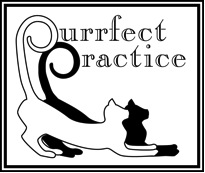Grant
Grant Moves Now
29/05/20 07:24 Filed in: History
Earlier this week The History Channel had a 3-night, 2-hour TV program on Ulysses S. Grant. It was quite well done with a mix of re-enactments and commentary by current military figures and cultural historians. It laid out the Civil War battle strategies well to where they were understood. Grant has always been Misunderestimated as a figure in history. Much has been covered and yet much needs still to be learned.
I have written on this blog previously about having a leather bound set of The Personal Memoirs of U. S. Grant. I likely have 4-5 other books on Grant in our library. The books pictured following are the set of Memoirs that I have inherited.
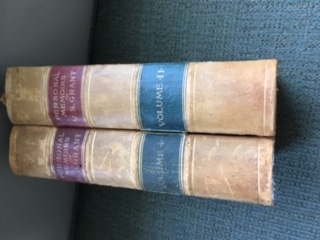
I have written on this blog previously about having a leather bound set of The Personal Memoirs of U. S. Grant. I likely have 4-5 other books on Grant in our library. The books pictured following are the set of Memoirs that I have inherited.

Comments
More on Appomattox
10/04/15 07:01 Filed in: History
Here is another well written piece about the surrender at Appomattox. There are many good writers out there who can bring that day 150 years ago into the present.
One hundred and fifty years ago today, Robert E. Lee acknowledged the inevitable.
His forces shrunken and surrounded, his provisions dwindling rapidly, the Union Army pressing the attack, Lee first acknowledged to himself, then to his fellow Confederate officers, and finally to Ulysses Grant that the South was defeated.
“The time has come,” Lee told aide-de-camp Walter Herron Taylor, “for capitulation.”
“Well, sir,” Col. Herron replied, “speaking only for myself; to me, any other fate is preferable.”
One hundred and fifty years ago today, Robert E. Lee acknowledged the inevitable.
His forces shrunken and surrounded, his provisions dwindling rapidly, the Union Army pressing the attack, Lee first acknowledged to himself, then to his fellow Confederate officers, and finally to Ulysses Grant that the South was defeated.
“The time has come,” Lee told aide-de-camp Walter Herron Taylor, “for capitulation.”
“Well, sir,” Col. Herron replied, “speaking only for myself; to me, any other fate is preferable.”
Grant Not Short of Audacity
25/03/14 07:40 Filed in: History
General U.S. Grant did not run around trumpeting “The Audacity Of Hope”. He just performed his job audaciously and quietly. He often was not always right in his methods in the short term but his perseverance in the long wore down the Southern armies and allowed the Northern armies to win. Another enjoyable article about Grant can be found here in the Weekly Standard.
Independence Day and Vicksburg
04/07/13 09:33 Filed in: History
We have not made it to Vicksburg to visit Civil War sites. Vicksburg did fall on this day 150 years ago to General Grant. Gettysburg had led to a defeat of the Confederate Army and its slow withdrawal from Pennsylvania back to Virginia.
One reason we can celebrate our Independence Day together as a country is due to the character and foresight of Abraham Lincoln. In some of the early Lincoln-Douglas debates, there is a speech from July 10,1858 where Lincoln replied to Douglas. As one column states, its eloquence concludes with what this Independence Day means to many Americans.
“Now, it happens that we meet together once every year, sometime about the 4th of July, for some reason or other. These 4th of July gatherings I suppose have their uses. If you will indulge me, I will state what I suppose to be some of them.
We are now a mighty nation, we are thirty—or about thirty millions of people, and we own and inhabit about one-fifteenth part of the dry land of the whole earth. We run our memory back over the pages of history for about eighty-two years and we discover that we were then a very small people in point of numbers, vastly inferior to what we are now, with a vastly less extent of country,—with vastly less of everything we deem desirable among men,—we look upon the change as exceedingly advantageous to us and to our posterity, and we fix upon something that happened away back, as in some way or other being connected with this rise of prosperity. We find a race of men living in that day whom we claim as our fathers and grandfathers; they were iron men, they fought for the principle that they were contending for; and we understood that by what they then did it has followed that the degree of prosperity that we now enjoy has come to us. We hold this annual celebration to remind ourselves of all the good done in this process of time of how it was done and who did it, and how we are historically connected with it; and we go from these meetings in better humor with ourselves—we feel more attached the one to the other, and more firmly bound to the country we inhabit. In every way we are better men in the age, and race, and country in which we live for these celebrations. But after we have done all this we have not yet reached the whole. There is something else connected with it. We have besides these men—descended by blood from our ancestors—among us perhaps half our people who are not descendants at all of these men, they are men who have come from Europe—German, Irish, French and Scandinavian—men that have come from Europe themselves, or whose ancestors have come hither and settled here, finding themselves our equals in all things. If they look back through this history to trace their connection with those days by blood, they find they have none, they cannot carry themselves back into that glorious epoch and make themselves feel that they are part of us, but when they look through that old Declaration of Independence they find that those old men say that “We hold these truths to be self-evident, that all men are created equal,” and then they feel that that moral sentiment taught in that day evidences their relation to those men, that it is the father of all moral principle in them, and that they have a right to claim it as though they were blood of the blood, and flesh of the flesh of the men who wrote that Declaration [loud and long continued applause], and so they are. That is the electric cord in that Declaration that links the hearts of patriotic and liberty-loving men together, that will link those patriotic hearts as long as the love of freedom exists in the minds of men throughout the world. [Applause.]
Now, sirs, for the purpose of squaring things with this idea of “don’t care if slavery is voted up or voted down” [Douglas's "popular sovereignty" position on the extension of slavery to the territories], for sustaining the Dred Scott decision [A voice---"Hit him again"], for holding that the Declaration of Independence did not mean anything at all, we have Judge Douglas giving his exposition of what the Declaration of Independence means, and we have him saying that the people of America are equal to the people of England. According to his construction, you Germans are not connected with it. Now I ask you in all soberness, if all these things, if indulged in, if ratified, if confirmed and endorsed, if taught to our children, and repeated to them, do not tend to rub out the sentiment of liberty in the country, and to transform this Government into a government of some other form. Those arguments that are made, that the inferior race are to be treated with as much allowance as they are capable of enjoying; that as much is to be done for them as their condition will allow. What are these arguments? They are the arguments that kings have made for enslaving the people in all ages of the world. You will find that all the arguments in favor of king-craft were of this class; they always bestrode the necks of the people, not that they wanted to do it, but because the people were better off for being ridden. That is their argument, and this argument of the Judge is the same old serpent that says you work and I eat, you toil and I will enjoy the fruits of it. Turn in whatever way you will—whether it come from the mouth of a King, an excuse for enslaving the people of his country, or from the mouth of men of one race as a reason for enslaving the men of another race, it is all the same old serpent, and I hold if that course of argumentation that is made for the purpose of convincing the public mind that we should not care about this, should be granted, it does not stop with the negro. I should like to know if taking this old Declaration of Independence, which declares that all men are equal upon principle and making exceptions to it where will it stop. If one man says it does not mean a negro, why not another say it does not mean some other man? If that declaration is not the truth, let us get the Statute book, in which we find it and tear it out! Who is so bold as to do it! [Voices---"me" "no one," &c.] If it is not true let us tear it out! [cries of "no, no,"] let us stick to it then [cheers], let us stand firmly by it then. [Applause.]”
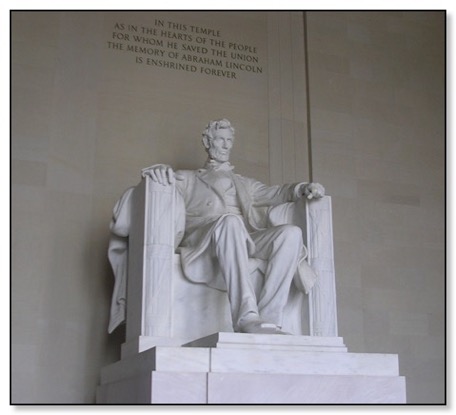
One reason we can celebrate our Independence Day together as a country is due to the character and foresight of Abraham Lincoln. In some of the early Lincoln-Douglas debates, there is a speech from July 10,1858 where Lincoln replied to Douglas. As one column states, its eloquence concludes with what this Independence Day means to many Americans.
“Now, it happens that we meet together once every year, sometime about the 4th of July, for some reason or other. These 4th of July gatherings I suppose have their uses. If you will indulge me, I will state what I suppose to be some of them.
We are now a mighty nation, we are thirty—or about thirty millions of people, and we own and inhabit about one-fifteenth part of the dry land of the whole earth. We run our memory back over the pages of history for about eighty-two years and we discover that we were then a very small people in point of numbers, vastly inferior to what we are now, with a vastly less extent of country,—with vastly less of everything we deem desirable among men,—we look upon the change as exceedingly advantageous to us and to our posterity, and we fix upon something that happened away back, as in some way or other being connected with this rise of prosperity. We find a race of men living in that day whom we claim as our fathers and grandfathers; they were iron men, they fought for the principle that they were contending for; and we understood that by what they then did it has followed that the degree of prosperity that we now enjoy has come to us. We hold this annual celebration to remind ourselves of all the good done in this process of time of how it was done and who did it, and how we are historically connected with it; and we go from these meetings in better humor with ourselves—we feel more attached the one to the other, and more firmly bound to the country we inhabit. In every way we are better men in the age, and race, and country in which we live for these celebrations. But after we have done all this we have not yet reached the whole. There is something else connected with it. We have besides these men—descended by blood from our ancestors—among us perhaps half our people who are not descendants at all of these men, they are men who have come from Europe—German, Irish, French and Scandinavian—men that have come from Europe themselves, or whose ancestors have come hither and settled here, finding themselves our equals in all things. If they look back through this history to trace their connection with those days by blood, they find they have none, they cannot carry themselves back into that glorious epoch and make themselves feel that they are part of us, but when they look through that old Declaration of Independence they find that those old men say that “We hold these truths to be self-evident, that all men are created equal,” and then they feel that that moral sentiment taught in that day evidences their relation to those men, that it is the father of all moral principle in them, and that they have a right to claim it as though they were blood of the blood, and flesh of the flesh of the men who wrote that Declaration [loud and long continued applause], and so they are. That is the electric cord in that Declaration that links the hearts of patriotic and liberty-loving men together, that will link those patriotic hearts as long as the love of freedom exists in the minds of men throughout the world. [Applause.]
Now, sirs, for the purpose of squaring things with this idea of “don’t care if slavery is voted up or voted down” [Douglas's "popular sovereignty" position on the extension of slavery to the territories], for sustaining the Dred Scott decision [A voice---"Hit him again"], for holding that the Declaration of Independence did not mean anything at all, we have Judge Douglas giving his exposition of what the Declaration of Independence means, and we have him saying that the people of America are equal to the people of England. According to his construction, you Germans are not connected with it. Now I ask you in all soberness, if all these things, if indulged in, if ratified, if confirmed and endorsed, if taught to our children, and repeated to them, do not tend to rub out the sentiment of liberty in the country, and to transform this Government into a government of some other form. Those arguments that are made, that the inferior race are to be treated with as much allowance as they are capable of enjoying; that as much is to be done for them as their condition will allow. What are these arguments? They are the arguments that kings have made for enslaving the people in all ages of the world. You will find that all the arguments in favor of king-craft were of this class; they always bestrode the necks of the people, not that they wanted to do it, but because the people were better off for being ridden. That is their argument, and this argument of the Judge is the same old serpent that says you work and I eat, you toil and I will enjoy the fruits of it. Turn in whatever way you will—whether it come from the mouth of a King, an excuse for enslaving the people of his country, or from the mouth of men of one race as a reason for enslaving the men of another race, it is all the same old serpent, and I hold if that course of argumentation that is made for the purpose of convincing the public mind that we should not care about this, should be granted, it does not stop with the negro. I should like to know if taking this old Declaration of Independence, which declares that all men are equal upon principle and making exceptions to it where will it stop. If one man says it does not mean a negro, why not another say it does not mean some other man? If that declaration is not the truth, let us get the Statute book, in which we find it and tear it out! Who is so bold as to do it! [Voices---"me" "no one," &c.] If it is not true let us tear it out! [cries of "no, no,"] let us stick to it then [cheers], let us stand firmly by it then. [Applause.]”

Early Grant
Last night, Richard and Josi Lewis, our neighbors here in Berlin, invited us to dine out at Red Lobster in Eugene. We had a lively discussion. They are readers and book lovers too. We ended the evening at Barnes and Noble where I purchased as one of 3 books, an biography of Grant. I told them of a recent blog article of the Ohio Congressman, Thomas Hamer, who helped Grant get into West Point in one of the last slots he had available to give. The story of Thomas Hamer’s influence on history and what his loss might have meant to our country is found in the article here.
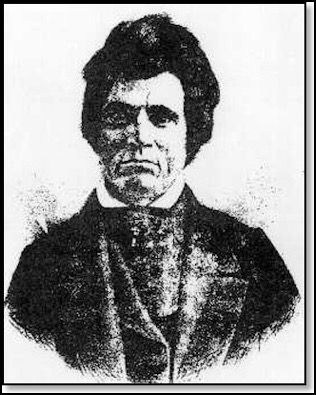
General Thomas Hamer

General Thomas Hamer
Grant's Regret
09/12/12 08:19 Filed in: Interests
During the Civil War, General Grant issued an order expelling Jews from the army’s Dept. of Tennessee and also from the suppliers for that army. This was a very anti-semitic order which haunted Grant. He came to personally regret his action and believe that he had done a huge injustice to this group of people. Grant went on to compensate for that error and become a huge supporter of the Jewish population. There is a current book discussing this issue. It is one history I have not purchased though I plan to do so at some point. We have a leather bound copy of Grant’s memoirs, considered the best written of any President’s memoirs. A story about Grant’s General Order No. 11 and its impact is here.
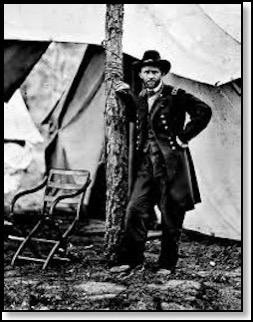

Memorable First Sentences
25/08/12 15:41 Filed in: Interests
There are those questions that make you think and engender others to share their thoughts too in answer. I read a blog post today on the blog, Richochet, that was written by Peter Robinson. He is a very interesting fellow who interviews many leading figures of our times. The interviews are fascinating discussions and certainly, he has to craft questions that enhance dialogue and therefore, learning. His question on this blog was about which books have individuals read, in this case, autobiographies, with memorable first sentences. One of his examples is the superb autobiography of Ulysses S. Grant. The comment section went on to include thoughts from members on their favorite first sentences. I jump into books so fast that I am past a first sentence in light year speed. So, I went back to see what LMM wrote for “Anne of Green Gables”. It is long, yet pulls you right in to the heart of the story about a girl and Avonlea.
“Mrs. Rachel Lynde lived just where the Avonlea main road dipped down into a little hollow, fringed with alders and ladies’ ear drops and traversed by a brook that had its source away back in the woods of the old Cuthbert place; it was reputed to be an intricate, headlong brook in its earlier course through those woods, with dark secrets of pool and cascade; but by the time it reached Lynde’s Hollow it was a quiet, well-conducted little stream, for not even a brook could run past Mrs. Rachel Lynde’s door without due regard for decency and decorum; it probably was conscious that Mrs. Rachel was sitting at her window, keeping a sharp eye on everything that passed, from brooks and children up, and that if she noticed anything odd or out of place she would never rest until she had ferreted out the whys and wherefores thereof.”
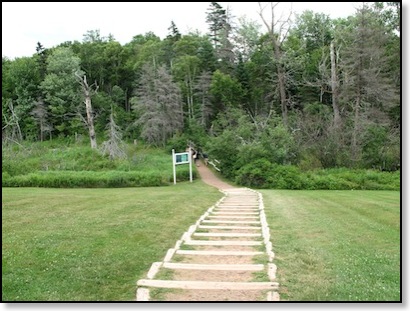
Haunted Wood Hollow at Green Gables House
“Mrs. Rachel Lynde lived just where the Avonlea main road dipped down into a little hollow, fringed with alders and ladies’ ear drops and traversed by a brook that had its source away back in the woods of the old Cuthbert place; it was reputed to be an intricate, headlong brook in its earlier course through those woods, with dark secrets of pool and cascade; but by the time it reached Lynde’s Hollow it was a quiet, well-conducted little stream, for not even a brook could run past Mrs. Rachel Lynde’s door without due regard for decency and decorum; it probably was conscious that Mrs. Rachel was sitting at her window, keeping a sharp eye on everything that passed, from brooks and children up, and that if she noticed anything odd or out of place she would never rest until she had ferreted out the whys and wherefores thereof.”

Haunted Wood Hollow at Green Gables House
